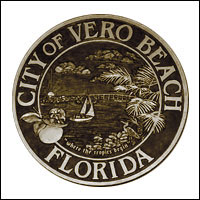 Stormwater utility tax details being worked out by city
Stormwater utility tax details being worked out by city
STORY
The City of Vero Beach has spent $51,000 so far studying how to implement a stormwater utility tax, and city officials plan to spend at least another $15,000 convincing residents that it’s a good idea.
The question of whether or not to impose the tax will likely go on this fall’s ballot, but the City Council must decide a few things first. A report received from consultants last week outline numerous options for raising the nearly $6 million the city says it needs between now and 2020 to fund projects to minimize the impact of stormwater runoff on the Indian River Lagoon.
The stormwater tax would only be charged to residents within the city limits, and it would be charged based upon Equivalent Residential Units, or ERUs, that correspond to the amount of stress each property places on the stormwater system, as determined by the amount of permeable and impermeable area on the property.
The formula for how the city would calculate and assess the ERUs is still up for consideration and four options are detailed in the consultant’s report, compiled in conjunction with city staff. But to raise $1 million per year for stormwater projects, each ERU would need to be charged at least $5 per month.
As an example of how this might work, a residential home with an average amount of paved driveway and patio might be charged one ERU, or $60 per year. A commercial property, school or church would be assessed multiple ERUs depending on the formula the City Council settles on.
But credits of up to 40 percent might be granted for properties using best practices to lessen their impact on the stormwater system. One example of that could be a property with its own stormwater retention pond, or a property with a grassy or other non-paved, porous surface as a parking lot.
Even properties that are tax-exempt would be subject to the stormwater tax, with city officials saying this is a fairer way to distribute the cost burden of taking care of the stormwater.
The way the stormwater tax would be billed to residents is another choice facing the City Council.
It could be added as a non-ad valorem assessment to property owners’ annual tax bills, but that would mean the city would need to have all the assessment information ready by Indian River County’s deadlines for getting out the bills. This approach would also prevent the city from implementing the stormwater utility in mid-year unless it was willing to delay revenue collection for many months.
Though consultants say the collection rate is higher if the assessment was added to tax bills, this approach would not work efficiently for tax-exempt or government-owned properties.
Another approach would be to add the stormwater tax to city residents’ utility bills, which would shift the burden from property owners to tenants in rental situations. That approach would reach anyone with a utility account, but it would not be as easy to match up land-use codes and categories, the consultants say in their report.
Though city officials have promised no new employees would be attached to a stormwater utility and that it would be run out of the Public Works Department, vehicles and other capital expenditures are on the wish list, which means there will also be ongoing costs for fuel and maintenance of that equipment.
Critics of the stormwater utility, including Councilwoman Pilar Turner, are skeptical that, once established, the stormwater utility will ever go away.
Both Turner and Councilman Harry Howle frequently remind the public during meetings that the stormwater utility fee is a tax – a tax that would amount to a nearly a 25 percent increase in revenues if the same dollars were collected via the property tax.
Howle has derided the stormwater assessment as a “regressive tax,” saying it would hit low-income residents and seniors on fixed incomes proportionately harder. He has called for stormwater projects to be funded through the municipal budget and not be tucked away in a special assessment.
By the time voters get a chance to weigh in on whether they want a stormwater utility for the City of Vero Beach, the City Council will have invested more than $100,000 in studying and promoting the idea.
In the budget of the stormwater consultant is $15,160 for public outreach, according to City Manager Jim O’Connor. Of that, $745 is slated for updating the city website and $14,415 for consultants “coming to council meetings and holding public meetings.”
Once the stormwater utility is officially a referendum question on the ballot, state law prohibits the city from engaging in electioneering to promote the city’s desired outcome. The law, which says any public funds must be spent on disseminating only “factual” information, is largely toothless, however. The school district has skirted this regulation for years using robo-calls, mailers and public workshops to “inform” the public about referendum questions involving more tax dollars for schools.
Should the matter be approved, assessing the fees property by property and setting up the billing system will involve more work by consultants and programmers and more expense. Four different firms currently are engaged in the study and technical aspects of plotting out Vero’s stormwater utility options.








